Years later, when I was a young newspaperman at the New York Post, my editor, Paul Sann, once stopped at my desk in the city room and handed me a collection of the stories of Sholem Aleichem. “Read this,” he said. “It’s about your tribe, too.” And so it was. Tevye the Dairyman was Murphy the Milkman. There were few saints, many sinners, some small heroes, a few cold villains. I understood then that in our world, each neighborhood was a kind of shtetl, an urban hamlet, complete with its own lore and legends and heartbreak.
But change never stopped. I wrote most of these tales in a city without personal computers, cell phones, tweets, digital cameras, or iPads. A world where “friend” was not yet a verb. The sources of the stories were varied: chance encounters on the Brooklyn streets, phone calls at the newspaper, letters from old classmates. My press card took me many places and to many stories. A court officer at a trial would stop me in the hall during a recess and tell me a tale. At a murder scene a detective would take me aside and tell me what happened to so-and-so from the Tigers. I’d visit grieving friends sitting shivah, or gathering at a wake, and once I was back out on the sidewalk, the tales came in a stream.
They are flowing still. I hope somebody is writing them down.
— Pete Hamill
I
IN THAT LOST CITY of memory, the wind is always blowing hard from the harbor and the snow is packed tightly on the hills of Prospect Park. They are skating on the Big Lake and the hallways of the tenements are wet with melted snow and the downtown stores are glad with blinking lights and the churches smell of pine and awe. And when I wander that lost Christmas city, I always think of Lev Augstein.
He was to become our Christmas kid. But he came among us one day in summer, a small, thin boy, nine years old, speaking a language we had never heard. His eyes were wide and brown and frightened, and he wore short pants that first day, and he stood on the corner near the Greek’s coffee shop, staring at us as we finished a game of stickball. When the game was over, my brother, Tommy, asked him to play with us, but the boy’s face trembled and he backed up, his eyes confused. Ralphie Boy handed him the Spaldeen and the boy shook his head in refusal and said something in that language and then ran away on toothpick legs to 11th Street.
“He don’t speak English,” Ralphie Boy said, in an amazed way. “He don’t even speak Italian!”
Within days, we learned that the new kid was from Poland, which we located with precision in our geography books. Poland was wedged between Germany and Russia, and the language he spoke was called Yiddish. We also learned that the boy was living with his uncle, a cool, white-haired man named Barney Augstein.
“If he’s related to Barney,” my father said at the kitchen table, “then he’s the salt of the earth.”
Barney Augstein was one of the best men in that neighborhood, and one of the most important. He was the bookmaker. Each day, dressed like a dude, smiling and smoking a cigar, Barney would move from bar to bar, handling the action. Until Lev arrived, Barney lived alone in an apartment near the firehouse, and they said in the neighborhood that long ago, he had been married to a Broadway dancer. She had left him to go to Hollywood, and this gave Barney Augstein an aura of melancholy glamour. Ralphie Boy, Eddie Waits, Cheech, and the others all agreed that any nephew of Barney Augstein was okay with us.
We learned that the new kid’s name was Lev. Ralphie Boy showed Lev how to hold a Spaldeen, throw it, catch it, hit it, and the rest of us taught him English. We told him the names of the important things: bat, ball, base; car, street, trolley; house, roof, yard, factory; store. Soda. Candy. Cops. Lev stood there while we pointed at things and he named them, proud when he got the word right, but trembling when he got it wrong. “I hate when he does that,” Ralphie Boy said one morning. “It’s like a dog that got beat too much.” And we noticed two things about him. He never smiled. And he had a number tattooed on his wrist.
“A number on his wrist?” my mother said one night. “Oh, my God.” She was silent for a while, then glanced out the window at the skyline glittering across the harbor. “Well, make sure you take care of that boy. Don’t let anything happen to him. Ever.”
The summer moved on. Lev put on weight, and Barney Augstein bought him clothes and Keds and a first baseman’s mitt. We tried to explain all of life to him, particularly the Dodgers. Lev listened gravely to the story of the holy team, and if he didn’t fully comprehend, he certainly tried. He recited the litany: Reiser, Reese, Walker…
“He play baseball good?” Lev said, pointing at a picture of Reiser in the Daily News . “He play stickball good?”
“Good?” Ralphie Boy said. “He’s like Christmas every day.”
“Christmas every day?” Lev said.
II
One afternoon, Barney Augstein came around with Charlie Flanagan. They were best friends, though Charlie was a cop. Their friendship was one reason Augstein could work openly as a bookmaker in the neighborhood without being arrested. My father said their friendship went back to Prohibition, when they lived on the Lower East Side and worked as guards on the whiskey runs to Canada. Now Charlie lived alone. He and Barney went to the fights together, and bought their clothes from the same tailor, and even went to Broadway shows. We were sitting on the cellar board of Roulston’s grocery store when they came over together.
“Listen, you bozos,” Augstein said. “One of yiz has been teachin’ my nephew bad woids, and I want it to stop.”
“Nah,” Ralphie Boy said.
“Don’t gimme ‘nah,’” Augstein said. “I’m warnin’ yiz. If yiz keep teaching Lev doity woids, I’ll have yiz t’rown in fronta da Sevent’ Avenue bus. Ya got that?”
“Dat goes for me, too,” Flanagan said. “Barney wants his nephew to be a gent, not a hat rack like you guys. So teach the kid right. And if I hear he gets in trouble, I’ll lock yiz all up.”
They turned around and walked across the street to Rattigan’s Bar and Grill, a couple of cool older dudes in sport shirts. They were laughing.
III
The trouble started around Labor Day weekend, and it all came from Nora McCarthy. She lived up the block from Rattigan’s, almost directly across 11th Street from Barney Augstein’s house. She was in her forties, a large, box-shaped woman with horn-rimmed glasses, and she was awful. Everybody’s business was her business, and when she wasn’t working at the Youth Board, a job she’d received from the Regular Democratic Club, she was policing private lives. My father called her Nora the Nose. Now she had begun investigating Lev Augstein. On Labor Day weekend, when we were feeling forlorn about the imminent return to school, she came over to us after a game.
“What’s this new boy’s name?” she said, pointing at Lev.
“Why?” Ralphie Boy said. “What business is it of yours?”
“I live in this neighborhood!” she snapped. “I have a right to know when strangers show up. Particularly if they live with a known criminal. And particularly if they are young. Young people are my job.”
We all made rude noises and laughed. But Lev did not laugh. He looked up at Nora McCarthy, at her severe hairdo, her coarse skin, the mole on her chin, the square, blocky hands, the hard judgmental lines that bracketed her mouth, and he sensed danger. He backed away, but Nora McCarthy grabbed his wrist. She moved her thumb and saw the tattooed number and then she smiled.
“You’re a Jew, aren’t you?” she said. “You’re one of those DPs. Those displaced persons. Aren’t you?” She gave Lev’s wrist a tug. “But I bet you don’t have any papers. You got that look. That scared look. Tell me the truth.”
Читать дальше












